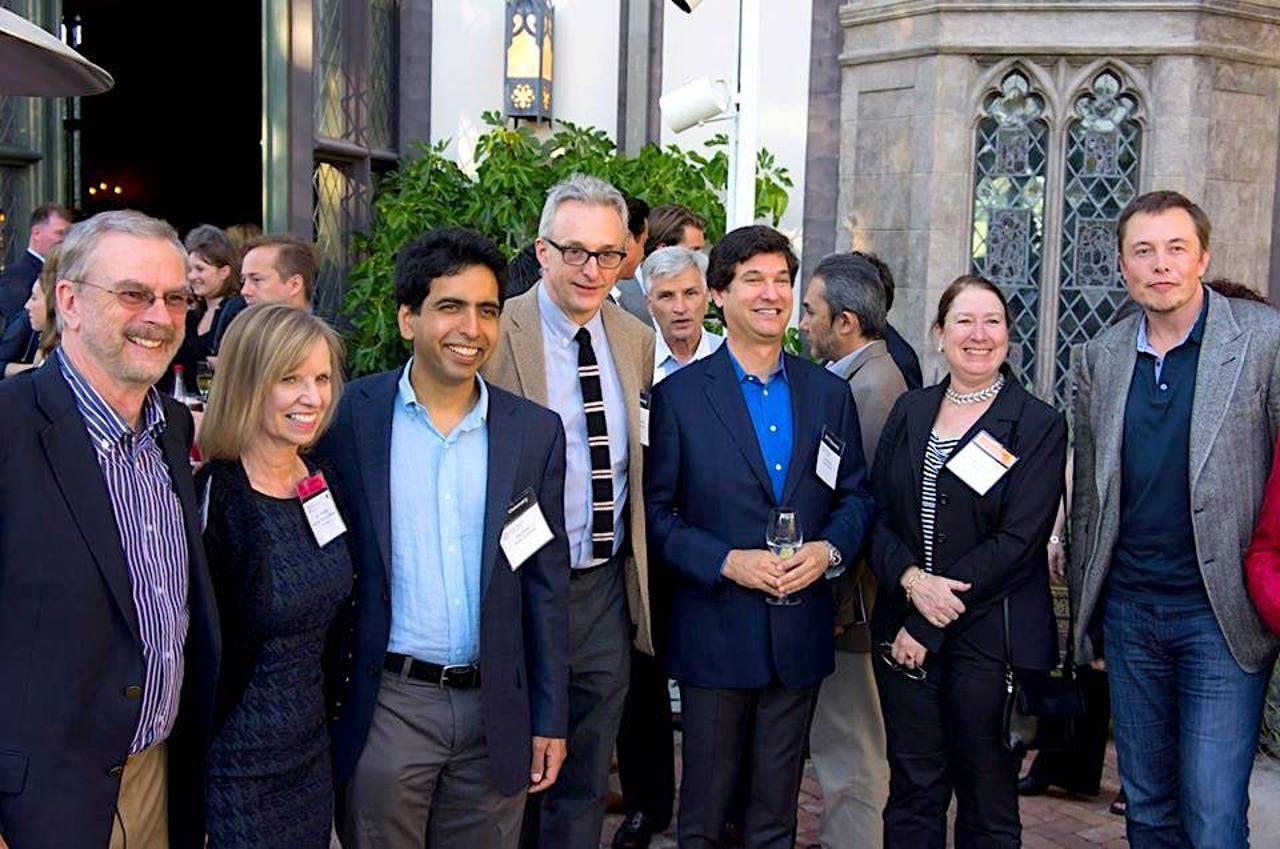Silicon Valley summers ... and winter is coming


Four winners of SV Visionary Awards in 2012, description below.
Foremski's Take
The SV Forum Visionary Awards used to be my favorite Silicon Valley summer event. These were small outdoor gatherings, maybe 150 to 200 people, and usually held in the substantial backyard of some fabulous Woodside mansion -- but always with incredible iconic names standing just a few feet away.
For example, the above photo shows the four award winners from eight years ago: Far-right is Elon Musk, next top VC Jim Breyer, technology journalist David Kirkpatrick, and educator Salman Khan. The legendary VC Ann Winblad is far left.
The casual atmosphere of the awards ceremony made for some excellent off-the-record conversations and excellent contact building for future on-the-record news stories.
Strangely, there was always very little press at this exclusive event, which I never understood because the access to key Silicon Valley figures was always off the charts.
And the backyard-casualness of the event was always a welcome break compared with the massive Silicon Valley trade shows and conferences during the rest of the year.
Certainly, in the post-COVID world outdoor events will return faster than indoor conferences, but both types of gatherings are off-the-table for an unknown length of time. This is very bad news for sales.
Silicon Valley depends on shows and conferences for face-to-face meetings and for making new contacts. Enterprise IT sales take 18 months to two years on average to complete. This will be tough for young companies that need to get their names out and don't have many contacts of their own.
A SMALL VILLAGE
The casual nature of the Visionary Awards made it feel that Silicon Valley is really just a small village with a small population but under a global microscope. Here, we quickly get used to seeing people that in the rest of the world are considered unapproachable icons or geniuses -- with great influence.
The Silicon Valley region deserves its reputation for innovation and as the home for many visionaries, it is a global engine of innovation. In recent years it's shifting more into the global engine for scaling a business.
SCALE TO WIN
Scaling is becoming the most important Silicon Valley specialty; companies have a first-to-scale chance to dominate a sector, because, in online markets, there's usually very little room for large competitors to co-exist.
Bricks and clicks used to be a viable strategy but no longer. Bricks took years to build out a business, which meant incumbent companies had time to adjust to any successful competitor and get a strategy.
Clicks allow you to scale in minutes… on demand. Expanding into new regions is easy without bricks, and so it means that the best business model wins and wins quickly and dominates a sector. In the bricks world, many competitors can co-exist for years even with bad business models.
The COVID-19 crisis has compressed this e-commerce trend as hundreds of millions of new users have flooded into online services of all types. It has had similar effects on the use of other technologies such as video-conferencing. The future is coming at us much faster than in the days pre-COVID-19. But this also means that all the societal problems associated with the future are rushing at us -- and we have less time to fix them.
FUTURE PROBLEMS ACCELERATED
We used to think that we would have many years to deal with serious issues such as: How do we deal with mass unemployment from tech-related job losses for no fault of the workers? What is fair GIG economy legislation? How do we deal with rising inequality? How do we offer universal healthcare that can stop the spread of virus outbreaks? How do we safeguard against fake news and hate speech while preserving fundamental rights? Privacy rights in contact tracing apps versus community safety. And many more questions.
Virtual reality pioneer and author Jaron Lanier asked "Who owns the Future?" in his excellent book of the same name. But the way the future will turn out is more about who has a say -- not just ownership. I don't own my apartment, but I have a say in how I live in it. We all share the same future. And that means shared responsibility for how we will live in that future.
Rather than getting out of the way of technology so it can find its own level in the economy -- as many tech boosters have suggested -- we have to make sure everyone shares in the benefits of technology.
There is no good reason for not doing this, because, fortunately, technology-driven markets are deflationary -- everything gets cheaper and can be offered at very low costs. (Jeff Booth describes technology's deflationary effect in his groundbreaking recent book The Price of Tomorrow -- review coming.)
DRIVING THE FUTURE
Our relationship with technology has been skewed by our language and how we write about it. We often describe inanimate technology as "the driver" of a particular trend. But an engine doesn't drive a car. Humans drive and decide on the destination.
Our technologies are tools that will enable a fabulous future of our design -- as long as we know where we are going -- which we don't.
The extraordinary circumstances of the COVID-19 crisis are boosting the use of new technologies across every industry and resulting in big organizational changes; all pushing us ever faster into a highly automated future. Yet we still haven't figured out how we will live in that future, and the legislation, culture, and economic structures that we will need to prosper.
I wish us all luck in this endeavor because we'll need it. Our societies change slowly -- no matter how fast the world turns.